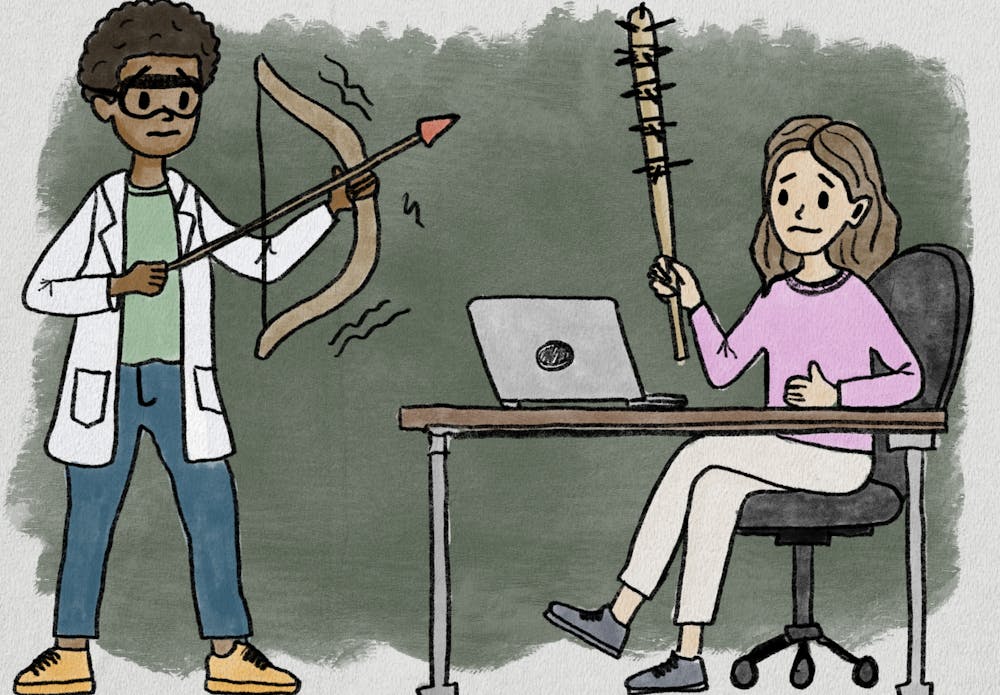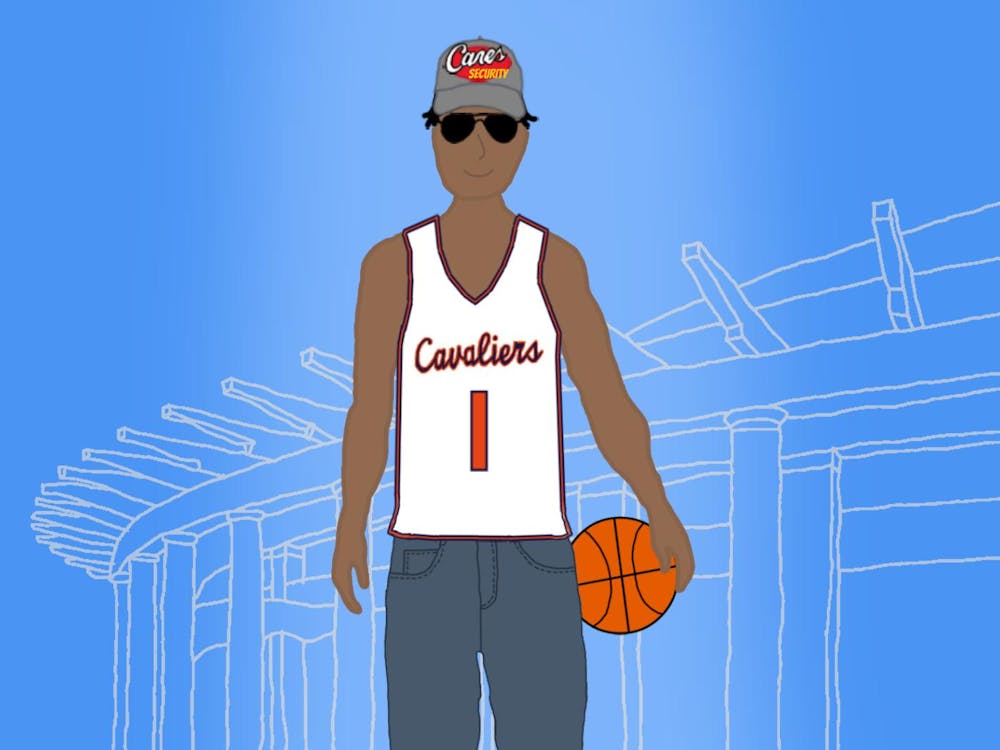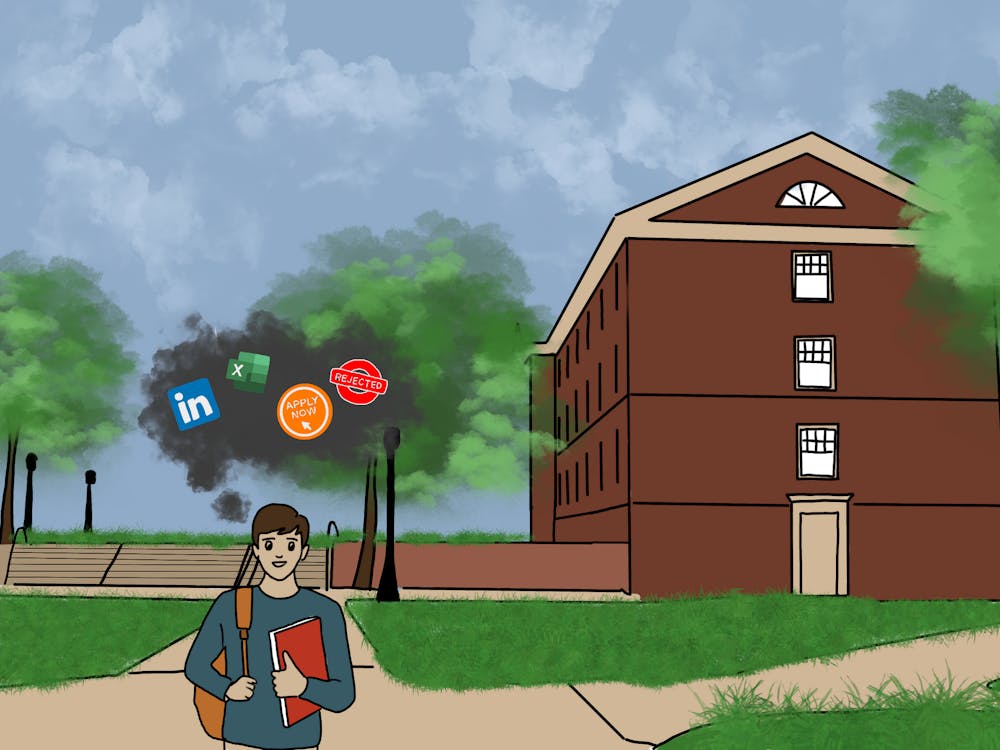Editor’s note: This article is a humor column.
After two long weeks of finals last spring, weed-out class professors were astonished to find that they’d failed to meet their 93 percent fail quota. With these goals unmet, the University acted fast to replace upcoming fall 2024 finals with “The Cavalier Hunger Games.”
Weed-out classes serve as prerequisites to sought-out majors and are thus structured to be generally cruel and unusual. Because of this, the weeds — students — are unable to declare majors they worked towards and secure stable careers. Historically, these classes have been one of the University’s most special and sacred practices.
In the spring of 2024, students taking weed-out courses such as Organic Chemistry I, Data Structures and Algorithms and Intro to Financial Accounting, ended with C+ averages rather than Fs. This made it possible for them to apply into the majors for which these classes serve as prerequisite. In the eyes of the University, this was an inexcusable break-down of the weed-out model.
Recently, students, parents and even some faculty members were notified that the University, in response to these high percentages, will void all current syllabi and cancel all finals for weed-out courses in the fall semester. Instead, students will compete in the University’s very first Hunger Games. Like the previous Olympic Games, this intense fight to the death will feature many of our very own Wahoo tributes.
This is not the University’s first attempt to creatively deal with its weed problem. Last semester, the University was forced to open up about their first sinister weed-out attempt after a student studying late night in Rice Hall stumbled into a closet full of paper towel dummies. It turned out that before enrollment even opened, these dummies were enrolled in fall classes in place of students. Physically, their purpose was to fill the seats of the classes on the first day, so that waitlisted students and those unable to enroll couldn’t possibly be able to sit-in on the class.
When this underhanded attempt was leaked, the University was forced to postpone the dummy takeover. But they refused to apologize for the plan, instead declaring that they were exploring alternative avenues of attack.
Last semester’s finals season and high pass rates were the final nail in the coffin. To ensure the sanctity of the University’s weed-out practice, President Jim Ryan and his administration enacted some important University policy changes, which, for full transparency, were detailed in his email.
After the high pass rate was observed, Ryan and his administration immediately called a meeting. This meeting brought together representatives from the District of Computer Science, the District of Commerce, and the District of Chemistry and Engineering. The “Capitol” was also at this meeting — a reference Ryan chose for the exceedingly rich donor community who have much sway over the University.
At the meeting, members of the University and the Capitol unanimously voted on the Cavalier Hunger Games Resolution. Thus, at the end of this fall, all students in weed-out classes will participate in a fight to the death in place of their finals.
The resolution included the creation of the Cavalier Hunger Games Committee. The Committee will oversee all aspects of the games, such as their design and the swift clean-up of John Paul Jones Arena after the game. Plans to make watching the Cavalier Hunger Games a part of the Engagements Experience were also drawn up at this meeting, but of course only for first years who were not reaped themselves.
Ryan, in his email, tried to assuage community concerns that this was an abnormally cruel version of finals which would imperil the job prospects of unsuccessful tributes.
“Some may disagree with [the University’s] decisions. But this is effective, efficient and modern. Reaped students who don’t emerge victorious will still have some future employment prospects. There are many opportunities to be cadavers for medical students to learn on or for the unpaid work of ‘ghosts in traumatic dreams of survivors.’”
Although Ryan anticipated some backlash, he likely did not anticipate the full-blown outrage his email received. It was blasted on social media, and some student-led CIOs such as the University Judiciary Committee, the Student Council and several student activist organizations began releasing statements condemning the University’s actions.
However, many of the students who will, in the future, be victims of this plan seemed to have a nonchalant response in return.
“Chem finals already killed me last semester, so, the Cavalier Hunger Games lowkey sounds better,” claimed second year College student Robyn Robynson, “I realize how f----d that sounds to anyone who hasn’t taken organic chemistry. But trust me, orgo changes you.”
Still, with the University sparking online controversy on the daily, and parents threatening to have their children transfer, Ryan asked his allies and the other representatives from the meeting to send statements supporting the Cavalier Hunger Games.
Within minutes, the mysterious Seven Society sent an email to the students. The message itself was anything but mysterious.
The email read, “The Cavalier Hunger Games is the best way for the University to maintain its academic integrity. Imposters who cannot fight to the death for their degree should not even be allowed into the program.”
These claims were backed by robust statistics that the Sevens provided themselves.
“These CS students are shooting shots with no aim. Engineering students may think they’re crafty, but if you hand them a sword, they'll hold it by the wrong end. Pre-med students might just get scared to death once they see all the eyes on them. And Comm is all bark and no bite. A fight to the death just might do them some good.”
The Capitol also issued a statement that they were, in summation, thrilled that the Cavalier Hunger Games resolution had been passed and hoped that in the coming semesters, more and more universities would follow suit.
“It’s a promising new age,” they said, “The age of academic barbarism. But in all seriousness, it’s just so exciting that we might have actual games for people to watch in John Paul Jones.”







